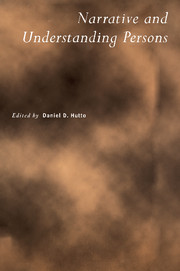Book contents
- Frontmatter
- Contents
- List of Contributors
- Notes on Contributors
- Narrative and Understanding Persons
- Framing Narratives
- The Narrative Practice Hypothesis: Origins and Applications of Folk Psychology
- Dramatic Irony, Narrative, and the External Perspective
- Episodic Ethics
- On the Distance between Literary Narratives and Real-Life Narratives
- Reasons to be Fearful: Strawson, Death and Narrative
- Stories, Lives, and Basic Survival: A Refinement and Defense of the Narrative View
- Self and Other: The Limits of Narrative Understanding
- Pathologies in Narrative Structures
Episodic Ethics
Published online by Cambridge University Press: 04 May 2010
- Frontmatter
- Contents
- List of Contributors
- Notes on Contributors
- Narrative and Understanding Persons
- Framing Narratives
- The Narrative Practice Hypothesis: Origins and Applications of Folk Psychology
- Dramatic Irony, Narrative, and the External Perspective
- Episodic Ethics
- On the Distance between Literary Narratives and Real-Life Narratives
- Reasons to be Fearful: Strawson, Death and Narrative
- Stories, Lives, and Basic Survival: A Refinement and Defense of the Narrative View
- Self and Other: The Limits of Narrative Understanding
- Pathologies in Narrative Structures
Summary
I guess I wont send that note now, for the mind is such a new place, last night feels obsolete (Emily Dickinson, 1830–1886).
She said: ‘Rejoice, for God has brought you to your fiftieth year in the world!’ But she had no inkling that, for my part, there is no difference at all between my own days which have gone by and the distant days of Noah about which I have heard. I have nothing in the world but the hour in which I am: it pauses for a moment, and then, like a cloud, moves on. (Samuel Hanagid, 996–1056, Vizier to the King of Granada)
Four temporal temperaments
The first thing I want to put in place is a distinction between one's experience of oneself when one is considering oneself principally as a human being taken as a whole, and one's experience of oneself when one is considering oneself principally as an inner mental entity or ‘self’ of some sort—I'll call this one's self-experience. When Henry James says, of one of his early books
I think of … the masterpiece in question … as the work of quite another person than myself … a rich … relation, say, who … suffers me still to claim a shy fourth cousinship'
he has no doubt that he is the same human being as the author of that book, but he doesn't feel he is the same self or person as the author of that book.
- Type
- Chapter
- Information
- Narrative and Understanding Persons , pp. 85 - 116Publisher: Cambridge University PressPrint publication year: 2007
- 10
- Cited by



